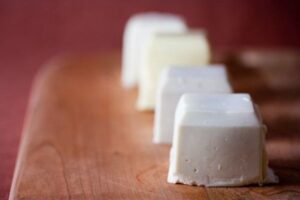I Can’t Believe it’s Not Better! The Ugly Truth About Non-Dairy Spreads

Hey, remember the 1980s? MTV was born, girls dressed like Madonna, boys like Michael Jackson and Ronald Reagan got shot. Strange times indeed. The Cola Wars were in full swing (Did you take the Pepsi Challenge?) and another food battle was raging: Butter versus Margarine.
I Can’t Believe It’s Not Butter hit the shelves in 1986 and quickly cemented itself as the flavorful alternative to saturated-fat-rich butter. Still, the battle of the bulge was not won with margarine, and by the early aughts, health experts debunked the fat myth, and butter was back in fashion. Sort of… Despite the return to butter for many, there are lots of reasons for avoiding it. So the revamped margarine, now “non-dairy spread” market has also boomed with seemingly less heinous versions than IcBinB bearing healthy sounding names (Smart Balance, Earth Balance, Canoleo, Soy Garden Natural Buttery Spread), but are they really good for you?
Of the most common dairy free spreads, all contain canola oil, and many, soy oil. While some use non-GMO oils, it’s important to note that non-organic canola and soy have a 93 percent chance of being genetically modified. As well, there are a number of studies that indicate neither are ideal oils for human consumption—organic or not. Canola contains fats that experts say should not be exposed to heat, and canola has been shown to deplete vitamin E levels in mammals. The plant itself (rapeseed) is an insect repellent and used in industrial manufacturing. Soy oil has been linked to breast cancer and its high levels of Omega-6s linked to inflammatory diseases.
None of the companies we reached out to returned our inquiries about their natural flavor ingredients, but regardless, you can be sure that they are heavily processed, which expert Carlos Monteiro says is never healthy.
Earth Balance, the dominant organic vegan/non-dairy spread brand, just launched a coconut-based “spread” and is heavily positioning it as more beneficial than straight coconut oil, an audacious claim that is quite simply, impossible. Coconut oil is rich in Omega fatty acids, as well as lauric acid, a rare medium-chain fatty acid that supports healthy metabolism and is being studied for anti-fungal, anti-viral, and anti-bacterial properties. Diluting it with canola oil and processed flavorings cannot possibly be healthier than the pure oil.
Most non-dairy spreads come in plastic tubs. Oil eats plastic, which often contains bisphenol-A and a number of other toxins linked to serious human health risks (besides being a petroleum-based product that is damaging to the environment).
Bottom line: Anything butter can do, pure coconut oil can do (better). And healthy fats, like coconut oil, hemp and flax seed oil, walnut, almond and olive oil offer a wider range of benefits and unrivaled flavor than processed spreads.
Keep in touch with Jill on Twitter @jillettinger
image:veganbaking.net

